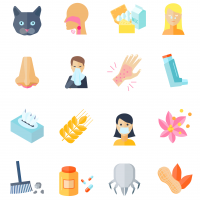
Confusion about allergies is putting people needlessly at risk say experts and medical charities.
In Making Sense of Allergies, a guide published today by Sense About Science [1], allergy specialists and charities warn that essential information and life-saving actions are being diluted in a sea of over diagnosis.
- There has been a rapid rise in allergies across developed countries. The percentage of children diagnosed with allergic rhinitis and eczema have both trebled in the last 30 years. Allergies are now better diagnosed and their incidence in populations has risen. But there is concern that allergy has also become a catch-all diagnosis for unexplained symptoms, and this rise has been accompanied by a lot of non-medical diagnosis and treatment.
- Most allergy tests and natural treatments offered on the high street and online have no scientific basis. These ineffective tests and other kinds of self-diagnosis are creating a large proportion of people who think they have an allergy when they don’t. One study found 40% of people report they have a food allergy, when in fact only 1-5% do. Another found 34% of parents reported food allergies in their children but only 5% actually had an allergy. Myths about artificial additives, junk food and immunisations causing allergies are also contributing to self-diagnosed allergy.
- The result is that people are not getting other medical conditions diagnosed, taking useless treatments, and needlessly restricting diets, including for children where resulting cases of malnutrition have been observed by clinicians. Meanwhile dangerous allergies are trivialised. Seven times as many people were admitted to hospital with severe allergic reactions in Europe in 2015 than in 2005. UK hospital admissions for anaphylaxis increased 615% between 1992 and 2012.
From the allergy experts:
Michael Perkin, Consultant Paediatric Allergist on behalf of Cochrane UK: “The level of misinformation surrounding allergies is staggering. Most of my consultations include refuting firmly held beliefs that usually have no scientific foundation. It is a great step in the right direction that Making Sense of Allergies has been produced. I very much hope it will help to empower families to understand better what allergies are all about.”
Paul Seddon, Consultant Paediatric Allergist on behalf of Cochrane UK: “I commonly see children who’ve been put onto unnecessarily restricted diets because their parents assume, in good faith, that they have allergies to multiple foods on the basis of ‘allergy tests’ which have no scientific basis. This needs to stop, which can only happen if we debunk these 'tests'."
From the Cochrane Library:
'Allergies: treatment and prevention' has also launched. This Cochrane Library Special Collection brings together recent systematic reviews of the evidence for treating and preventing allergies: http://bit.ly/Cochrane_Allergy_Treatment_and_Prevention_review
[1] Making Sense of Allergies was published with support from partners: British Society for Immunology, Cochrane UK, Allergy Academy, Allergy UK, Asthma UK, Anaphlaxis Campaign and British Society forAllergy & Clinical Immunology. See more at: http://www.senseaboutscience.org/pages/making-sense-of-allergies.html#sthash.12XfRlRY.dpuf
Click here to read the Q&A Mumsnet session with Sense About Science on allergies that was held in June 2015.
